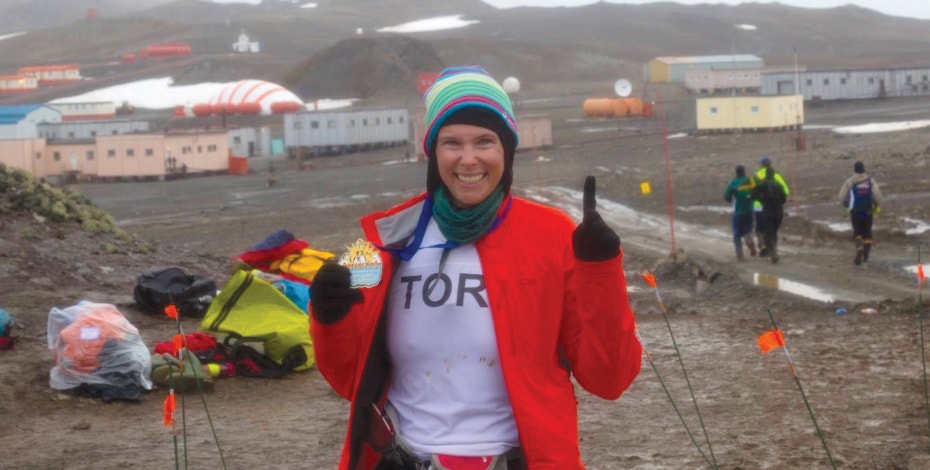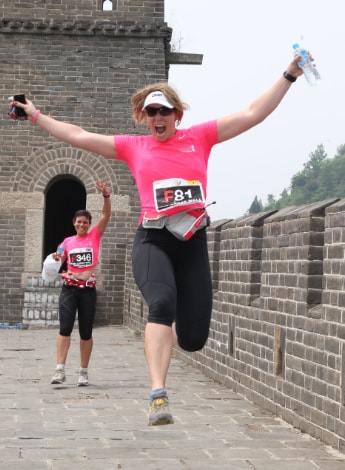
Tory races towards the finish line

For someone who thought running was ‘a bit silly’ and didn’t much like it, Tory Toogood has done an awful lot of it. Tory speaks with Melissa Mitchell on the eve of achieving her long-held—and inadvertently delayed—goal of running a marathon on each of the seven continents.
Beyond the finish line of the Marathon Rapa Nui 2019 in the Chilean-controlled Easter Island this month, Tory Toogood has some difficulty picturing the next step. Naturally, when you’re incredibly focused on the task at hand, deciding what will come next is not much of a high priority. But there is one thing Tory can guarantee—running more marathons will be part of her future.
Just how the APA Men’s, Women’s and Pelvic Health Physiotherapist came to compete in a marathon on each of the seven continents—known as the World Marathon Challenge—is an incredible story, one driven initially by a passion to raise awareness and money for bowel cancer screening. But more than that, it is a story about equal parts determination and inspiration that began in 2011 when
Tory came across some information about the famed New York Marathon. Tory had been an elite rower (she was a member of the Australian rowing team from 1991 to 1996 and competed at the Olympics) but had never considered herself suitable for running.
‘I didn’t like running, I thought running was silly, particularly for someone with a larger frame like me. I’m very much a rower,’ Tory says. ‘I always thought running was good for little people, not for big people. So I thought I would challenge my belief—my limiting belief—and see if I could learn to run. Also, I had seen a couple of social media posts about the New York Marathon, and I thought “Well, I’ve always loved to go to New York, and that looks amazing” and that maybe if I signed up for the marathon it would make me learn to run.’
This giant leap of faith saw Tory take her first tentative steps towards training for the marathon. Juggling her parenting responsibilities with full-time work, running her private practice Vital Core Physiotherapy in Adelaide and maintaining voluntary roles in the APA, Tory found time to begin small training runs, albeit sometimes at the ‘obnoxious time’ of 4am on a Saturday before readying her children for their regular sporting commitments.
‘I found a training program on the internet that made sense to me, and it was only three runs a week. I just trusted the process. I did every single session; I did not skip one on that program. I trusted … that this program was designed to get me to a point that I can run for four hours,’ Tory says.
Slowly but surely Tory built the mental and physical endurance required of a marathon runner, and lined up for the New York Marathon on 6 November, 2011. She finished in the second quartile with a time of three hours and 50 minutes. It was by chance that Tory then read an article about running a marathon on each of the seven continents—a feat achieved by fewer than 200 Australians. With her characteristic determination (‘I’m quite goal focused and motivated by big goals’), Tory decided she was going to make the World Marathon Challenge her personal quest, and she set out to raise money for a cause close to her heart as well—the Jodi Lee Foundation (see adjacent page).
With her interest in sports, pelvic health and women’s health physiotherapy—particularly pelvic floor rehabilitation, management of pelvic pain and incontinence, management of pregnancy-related pain, and pregnancy and post-natal concerns—Tory identified a gap in awareness of bowel cancer among the general population. She made it her mission to spread the word about the importance of early detection as loudly and effectively as she could, feeling she could achieve this by using every opportunity to discuss the issue as she met each marathon goal.
When she ran in her fourth marathon, the Africa Kilimanjaro Marathon in Tanzania in 2013, the tall blonde woman in a black tutu created quite a spectacle among the mostly African competitors. ‘There was much mirth at this giant blonde woman … there were not many non-African people in the marathon to start with, they thought it was hilarious to see me in a black tutu,’
Tory says. The move piqued curiosity about Tory and the motivation behind her eye- catching running attire among the running community and more broadly.
After competing in marathons on the North American, Asian, Australian, African and European continents, by February 2014 Tory was set to run in the Caracas Marathon in South America when the event was abruptly cancelled five days out. Instead, two weeks later Tory competed in the Antarctica
Marathon; she became the first woman to cross the finish line, finishing fifth overall in a time of four hours and 48 minutes. But from this marathon, her quest stalled—for six years.
However, the final continent will be conquered this month, when Tory lines up to compete in the Easter Island Marathon (which only accepts 180 participants due to the island’s size).
‘With the Caracas marathon, there were violent political protests in the middle of town where the police were shooting at, and killing, unarmed students. So the event was cancelled,’ Tory says. ‘It’s taken me a long time to be able to get back there [South America]. I’ve been stranded on six [out of the seven continents] for five years. I’ve hated having this unfinished project, so I’m finally getting around to finishing it.’
Tory has spent the intervening years honing her long distance running skills by integrating plenty of variety into her running program. Sometimes running with others and sometimes alone, Tory is also a big fan of listening to physiotherapy-related podcasts as she runs, saying it is a great way to incorporate more professional development in to her spare time.
‘The mental battle has been a big one over the years; how to get used to running for two hours, to get used to running for three hours. I do some of it in groups, with other people, which always makes it easier.
Eventually you get to a point where you can happily run and chat the whole way,’ Tory says. ‘I’m lucky in that I have quite good endurance, naturally. It was enough to have me being an Olympic athlete in my youth, but this is … quite a different thing, and I guess it plays to my strengths in that it is about endurance. But I wouldn’t say that I was a natural at running.’
Tory also uses her physiotherapy knowledge to improve her running ability. ‘I know and understand a lot about load monitoring and how to recognise a good training program, how to build a good training program. Over the years, I have had injuries and I’ve been able to restructure my training program as part of my rehabilitation. I have found with injuries, though, that I am best off seeking the support of another physiotherapist to help me with diagnosing and problem solving—it’s very hard to be really objective about yourself,’ she says.
Overall, Tory has competed in 14 marathons across the globe—including some of the major events as well as some smaller, local ones. Excluding the World Marathon Challenge, Tory has run in events in Berlin, Boston, Chicago, Melbourne, the Barossa, Pichi Richi in Port Augusta in South Australia and on Kangaroo Island.
So what happens when she completes the marathons on seven continents this month?
‘I haven’t even thought about it; funny, isn’t it? I’m really focused on the goal, but what comes after is almost secondary,’ Tory says. ‘I’ve done four out of six of the world majors, so over the next couple of years I’ll get those next two done—London and Tokyo.’
June is bowel cancer awareness month and Tory hopes to encourage everyone to undergo regular bowel cancer tests. There is still time to support Tory in this month’s marathon: visit torytoogood.com.au/ sponsor-me and follow the links.
‘Bowel cancer is one of those things that’s so very, very treatable when it’s caught early, and so devastating when it’s not.
There are too many stories of too many people, too young, being diagnosed, and it’s so easy and relatively accessible to do the test kits at home. By relatively accessible, I mean if it’s separate to the government program, which doesn’t kick in until you’re 50, it’s only $40 to get the kit and do the test at home,’ Tory says.
‘You send off your small sample, just using a paintbrush, you’re not sending your poo in the mail, and ... that’s all it is. The results get sent to you and to your doctor, so if there is anything that needs following up, your doctor is in the loop with it. It is recommended to do the test every year to keep on top of things. Through the Foundation, I am that much more aware of the amazing stories of people who have been picked up as part of a corporate testing program or something like that, and been able to catch a very serious diagnosis nice and early and therefore have a good outcome.’
BLACK TUTU A SYMBOL OF HOPE

The Jodi Lee Foundation was established in memory of Jodi Lee, who died of bowel cancer in 2010 at the age of 41.
The Foundation is driven to empower people to take active steps to prevent bowel cancer and live healthy lives. It does this through a number of national initiatives that encourage Australians to screen regularly, know their family history, act quickly on symptoms and maintain a healthy lifestyle.
Jodi had no particular risk factors, no family history of bowel cancer, no good reason to have bowel cancer and was a fit and healthy mother of two—something that resonated with Tory. In each of her marathons Tory wears a black tutu, the symbol of the Jodi Lee Foundation.
Tory says: ’90 per cent of all bowel cancers are curable, so long as they are caught early enough. It is the second most deadly cancer behind lung cancer and is far more deadly than breast, prostate and cervical cancer put together. And that’s largely because of a lack of awareness and screening.’
Tory has so far raised more than $18,000 for the Jodi Lee Foundation. Click here to find out more.
© Copyright 2024 by Australian Physiotherapy Association. All rights reserved.





